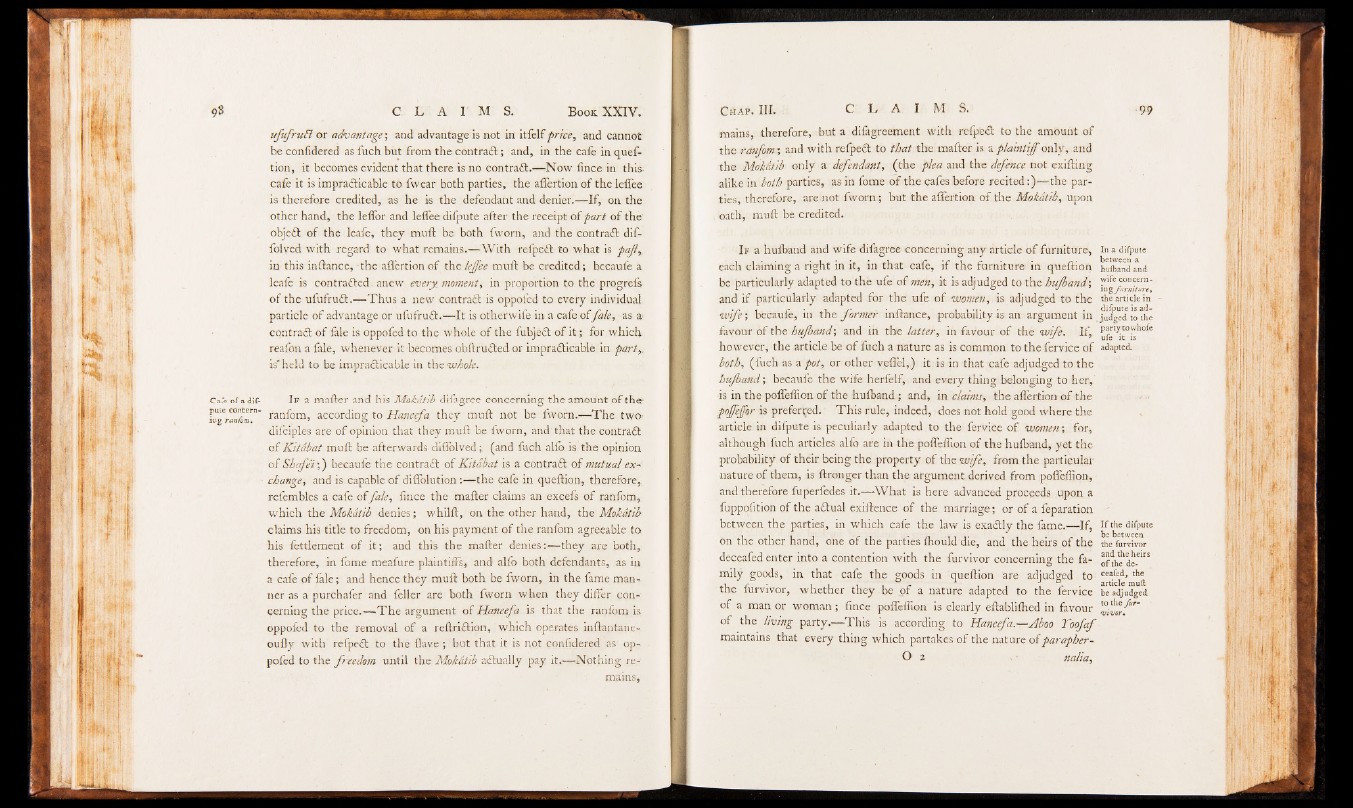
R
98 C L A I M S. Book XXIV.
ufufruEi or advantage; and advantage is not in itfelf price, and cannot
be confidered as fuch but from the contract; and, in the cafe in quef-
tion, it becomes evident that there is no contradt.— Now fince in this-
cafe it is impracticable to fwear both parties, the affertion of the leflee
is therefore credited, as he is the defendant and denier.— If, on the
other hand, the leflor and leflee difpute after the receipt of part of the
objedt of the leafe, they muft be both fworn, and the contradt dif-
folved with regard to what remains.— With refpedt to what is paß,
in this inftance, -the aflertion of the leffee muft be credited; becaufe a
leafe is contradted. anew every, moment, in proportion to the progrefe
of the ufufrudt.— Thus a new contradt is oppofed to every individual
particle of advantage or ufufrudt.:— It is otherwife in a cafe offale, as a
cqntradt of fale is oppofed to the whole of the fubjedt of i t ; for which
reafon a fale, whenever it becomes obftrudted or impradticable in part,
is'held to be impradticable in the whole.
Ca.e of adif- If a mafter and his Mokdtib difagree concerning the amount of thet
lagtmaim"' tanfom, according to Haneefa they muft not be fworn.— The two
difciples are of opinion that they muft be fworn, and that the contradt
of Kitäbat muft be afterwards diflolved; (and fuch alfb is the opinion
of Shafei;) becaufe the contradt of Kitäbat is a contradt of mutual exchangej
and is capable of diflolution:— the cafe in queftion, therefore,
refembles a cafe offale, fince the mafter claims an excefs of ranfom,
which the Mokdtib denies; whilft, on the other hand, the Mokdtib
claims his title to freedom, on his payment of the ranfom agreeable to
his fettlement of it; and this the mafter denies:— they are both,
therefore, in feme meafure plaintiffs» and alfo both defendants, as in
a cafe of fale; and hence they muft both be fworn, in the feme manner
as a purchafer and feller are both fworn when they differ concerning
the price.— T h e argument of Haneefa is that the ranfom is
oppofed to the removal of a reftridtion, which operates inftantane-
oufly with refpedt to the {lave; but that it is not confidered as oppofed
to the freedom until the Mokdtib adtually pay it.— Nothing remains,
mains, therefore, but a difagreement with refp'edt to the amount of
the ranfom', and with refpedt to that the mafter is a plaintiff only, and
the Mokdtib only a defendant, (the plea and the defence not exifting
alike in both parties, as in feme of the cafes before recited:)— the parties,
therefore, are not fworn; but the aflertion of the Mokdtib, upon
oath, muft be credited.
I f a hufband and wife difagree concerning any article of furniture, In a difpute
each claiming a right in it, in that cafe, if the furniture in queftion hulband and
be particularly adapted to the ufe of men, it is adjudged to the hufband',
and if particularly adapted for the ufe of women, is adjudged to the 1« article in
wife-, bfecaufe, in the former inftance, probability is an argument in ju d g ed to the
favour of the hujband-, and in the latter, in favour of the wife. If, yfet5j[0^hofe
however, the article, be of fuch a nature as is Common to thefervice of adapted.
bQth, (fuch as a pot, or other veflel,) it is in that cafe adjudged to the
hujband; becaufe the wife herfelf,. and every thing belonging to her,
-is in the pofleflion of the hulband ; and, in claims, the aflertion of the
pojfejfor is preferred. This rule, indeed, does not hold good where the
article in difpute is: peculiarly adapted to the fervice of women; for,
although fuch articles alfo are in the pofleflion of the hulband, yet the
probability of their being the property of the wife, from the particular
nature of them, is ftronger than the argument derived from pofleflion,
and therefore fuperfedes it.— -What is here advanced proceeds upon a
fuppofition of the adtual exiftence of the marriage; or of a feparation
between the parties, in which cafe the law is exadtly the feme.1— If, I f the difpute
bn the other hand, ohe of the parties fhould die, and the heirs of the the furvivor
deceafedenter into a contention with the furvivor concerning the fa- of Aede-6*”
mily goods, in that cafe the goods in queftion are adjudged to- ce!* d> th®
the furvivor, whether they .be of a nature adapted to the fervice be adjudged
of a man or woman; fince pofleflion is clearly eftablifhed in favour | f |B u |
o f the living party.— This is according to Haneefa.— Aboo Toofaf
maintains that every thing which partakes of the nature o fparapher-
O 2 . • nalia,